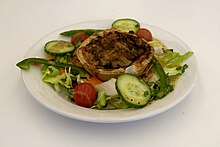
| Liturgical seasons |
|---|
|
Ember days (quarter tense in Ireland) are quarterly periods of prayer and fasting in the liturgical calendar of Western Christian churches.[1] The term is from Old English: ymbren, possibly derived from Latin: quatuor tempora.[2] These fasts traditionally take place on the Wednesday, Friday, and Saturday of the weeks following St Lucy's Day (13 December), the first Sunday in Lent, Pentecost (Whitsun), and Holy Cross Day (14 September), though some areas follow a different pattern. Ordination ceremonies are often held on Ember Saturdays or the following Sunday.
The observance of fasting and abstinence in the Catholic Church eliminated the Ember days in 1966. They remain a feature of other Western churches, such as in Anglicanism, where the Book of Common Prayer provides for the Ember days, in practice observed in different ways.[3][4]
- ^ Beck, Ashley (2023). "The Latin Bible and liturgy". In Houghton, H. A. G. (ed.). The Oxford handbook of the Latin Bible. Oxford handbooks series. New York: Oxford University Press. pp. 429–442. doi:10.1093/oxfordhb/9780190886097.013.2. ISBN 978-0-19-088609-7.
- ^ "ember, n.²". Oxford English Dictionary (Online ed.). Oxford University Press. doi:10.1093/OED/5126613664. (Subscription or participating institution membership required.)
- ^ Church of England (1716). The book of common prayer, and administration of the sacraments, and other rites and ceremonies of the church, according to the use of the Church of England: together with the psalter or Psalms of David, pointed as they are to be sung or said in churches. Oxford: Oxford University Press. hdl:2027/gri.ark:/13960/t81k49h7h.
- ^ Hampton, S. (2012-09-12). "'Welcome dear feast of Lent': Rival understandings of the forty-day fast in early Stuart England". The Journal of Theological Studies. 63 (2): 608–648. doi:10.1093/jts/fls111. ISSN 0022-5185.